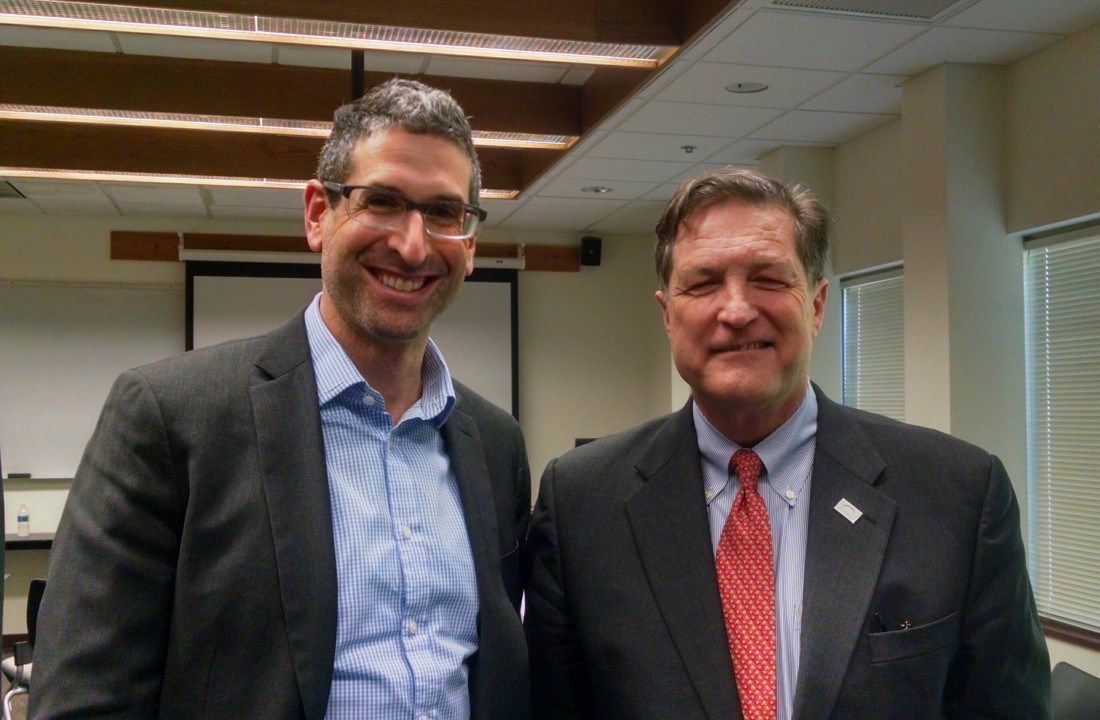Several representatives from the Federal Reserve Bank of Richmond gathered in an A-B Tech classroom Wednesday afternoon, Oct. 8, to host a discussion among local business owners. “This has been a fascinating visit for us,” said bank president Jeff Lacker. “It’s a really unique part of our district and country.”
The bank serves the Federal Reserve’s Fifth District, which encompasses the District of Columbia, Maryland, North Carolina, South Carolina, Virginia and most of West Virginia. Bank representatives visited Asheville in a bid to understand how Western North Carolina’s regional issues are both unique yet indicative of more widespread economic phenomena.
Jill Sparks, executive director of A-B Tech’s Small Business Center and Business Incubator, opened the discussion by highlighting the community college’s achievements in incubating fledgling ventures from a wide-range of industries. But conversation soon steered to technology-specific topics — in particular, Asheville firms’ struggle to attract and retain qualified IT professionals.
RISC Networks founder Jeremy Littlejohn referred to the problem as “talent pool issues,” recalling his difficulty in finding employees with both a specific skillset and a willingness to relocate to WNC.
“I’ve actually lost two people to Silicon Valley,” said DigitalChalk co-founder Troy Tolle, adding that the turnover resulted from the California tech hub’s reputation rather than a pay disparity.
Build Fax founder Joe Emison says his recruiting process improved over time. “We had to dramatically change our hiring practices,” he said, adding that the experience can be time consuming, “and we do find a tremendous amount of people willing to move. For the right person, we’ll pay a market Silicon Valley wage.”
“There’s no Asheville discount,” responded Littlejohn, pointing out that Asheville’s cost of living isn’t favorable enough to reduce his salary expenses as an employer.
Despite the challenges of operating in a developing technological environment, attendees expressed an unwavering commitment to WNC. “We just dug in, essentially,” said Galaxy Digital CEO Doss Church of his leadership team’s esteem for WNC. “We decided, come hell or high water, we’re not leaving.”
Hi-Wire Brewing Co. co-owner Adam Charnack echoed the same resolve, citing “investment in quality of life from local leaders” as a determining factor for setting up in Asheville. Unlike the tech leaders, however, Charnack finds it quite easy to recruit in Beer City USA.
Although later conversation ventured on to other topics — the benefits and drawbacks of telecommuting workforces, price distortion caused by underdeveloped yet over-funded startups and the potential for explosive growth in new industries due to collaborative economies, to name a few —none sparked as vigorous a debate as the tech talent conundrum.
“Don’t go too fast!” interjected one attendee as the meeting adjourned, alluding to the bankers’ ability to influence the federal interest rate.
“It was fascinating to hear about all the tech companies here,” said Lacker after the discussion, revealing that labor struggles are far from being unique to Asheville. “Everywhere we go in the country, we’re focused on the workforce and the labor markets and how well they’re working, and we hear from a lot of companies about being unable to find people with the right skills.”
Lacker’s team chooses several locales per year, holding similar roundtables. The forward-looking anecdotal information complements the Fed’s more traditional “rear-view mirror” numbers, he explained.
“I have a couple of research projects in mind that I’ll go back and talk to our folks about,” Lacker said, considering ways to apply insights from the meeting.
“We have a lot of strong technology entrepreneurs who want to be here and are committed to growing their businesses in Asheville,” said Josh Dorfman, director of entrepreneurial development at the Asheville Area Chamber of Commerce, “and I think some honest feedback came through about where the challenges are for these guys in terms of attracting the talent they need.”
“It was a really interesting conversation around running virtual companies,” he continued, recapping the crux of the discussion. “How do you innovate and get creative growing a company if you can’t necessarily attract all the talent here yet? It’s an area of focus we’re thinking about at Venture Asheville. How do we help solve that talent gap?”
“There’s a lot going on here. I’m really impressed with this place,” said Lacker before leaving AB-Tech’s campus. “I love Richmond, but it got me thinking about Asheville.”




Before you comment
The comments section is here to provide a platform for civil dialogue on the issues we face together as a local community. Xpress is committed to offering this platform for all voices, but when the tone of the discussion gets nasty or strays off topic, we believe many people choose not to participate. Xpress editors are determined to moderate comments to ensure a constructive interchange is maintained. All comments judged not to be in keeping with the spirit of civil discourse will be removed and repeat violators will be banned. See here for our terms of service. Thank you for being part of this effort to promote respectful discussion.